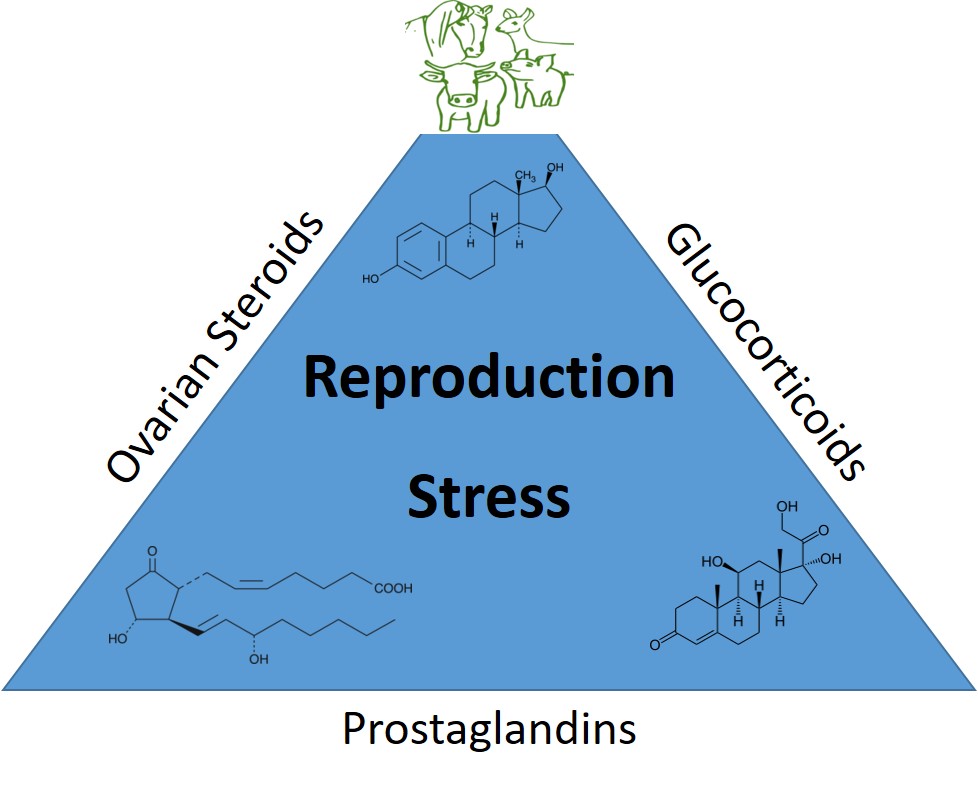Endocrinology
Endocrinology comprises the study of hormones. A hormone is a signaling molecule produced by endocrine tissues or glands and is transported by circulating body fluids such as the bloodstream to the target tissue cell where it binds to a specific receptor initiating a cellular response. Signaling hormonal effects can be endocrine (transported by the bloodstream to the target cell), paracrine (diffuses in tissue fluids to nearby cells, does not enter the circulation), autocrine (acts on the cell that secreted it) or intracrine (acts intracellularly on the cell that produced it). Synthesis and secretion of hormones is highly regulated through positive and negative feedback loops. Based on their chemical composition, peptide and proteins, glycoproteins, amines, steroids and eicosanoids can be distinguished. We mainly focus our research on detecting minute amounts of steroid hormones and eicosanoids during reproductive events in the circulating blood and in local tissues. We are interested in the regulation of the estrous cycle and the pregnancy period in livestock and wildlife species. Glucocorticoids, a group of steroid hormones, are involved in the stress response. We aim at identifying markers of stress in livestock and wildlife species. For the determination of steroid hormones and eicosanoids, we use liquid chromatography coupled to mass spectrometry and classical immunoassays.

Master thesis
Quantification of estrogens and their metabolites in mammalian tissues using an LC-MS/MS based approach
Background
Estrogens belong to the category of sex steroid hormones. In mammals, they are crucial for the development and regulation of the female reproductive system. While the most potent endogenous estrogen is estradiol-17β (E2), the most abundant free estrogen within the body circulation is estrone (E1). Both are conjugated during the phase II metabolism resulting in estrogen sulfates and glucuronides, respectively. Estrogen conjugates lack the ability to bind the estrogen receptor (ER) and are therefore not functionally active. However, they are considered to serve as a circulating reservoir for free estrogens. Target tissues like the female endometrium express transporters and enzymes specific for estrogen conjugates, thereby regulating local estrogen action.
Estrogens taken up from the environment can act as endocrine disrupting chemicals (EDC). The most studied synthetic EDC compound exerting estrogen action is Bisphenol A. Endogenous estrogens (E2 and E1) can likewise act as EDCs, specifically at low doses.
We have exposed pregnant gilts as model species to E2 by orally applying different doses of E2. Post oral uptake, E2 is absorbed and subsequently metabolized during hepatic first-pass metabolism. The metabolites are then circulating via the blood stream and distributed to target tissues.
Aim
Recently, we have successfully established an ultra-performance liquid chromatography tandem mass spectrometry (UPLC-MS/MS) based method to quantify estrogen conjugates in plasma. The quantification of the estrogens is performed on a nanoAcquity UPLC system coupled to a triple-stage quadruple mass spectrometer following solid phase extraction to extract estrogens from plasma. The task of this MSc thesis is to expand the method to quantify free and conjugated estrogens in liver, endometrium, and fat tissue. Thereby, the property of EDC acting through their interim state as conjugated forms will be assessed.
Applied Techniques
Solid-phase extraction (SPE), ultra-performance liquid chromatography (UPLC), nano-electrospray ionization (Nano-ESI), Triple-Quadruple Mass Spectrometry (Triple-Quadruple MS)
Duration
6 months (minimum)
Starting Date
please contact us
How to apply
Please apply via email with the title of the project in the subject line and address it to Anna Hankele (). Please, provide an up-to-date CV, university transcripts and a cover letter.
Requirements and Conditions
Bachelor's degree in biochemistry, chemistry, biology, agronomy, or further relevant disciplines
Independence and capacity for teamwork
Experience or strong interest in laboratory work in the field of LC-MS/MS
